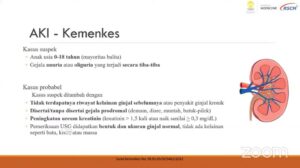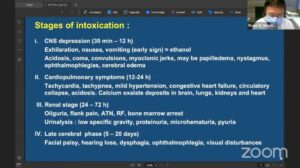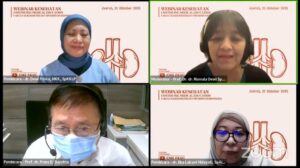
Since late August 2022, Ministry of Health of Indonesia (Kemenkes RI) and Indonesian Pediatric Society (IDAI) have received reports of a sharp increase in cases of Acute Kidney Injury (AKI) in children, especially in those under 5 years old. The number of cases reported until October 18, 2022 was 206 spread across 20 provinces with the mortality rate of patients treated at Cipto Mangunkusumo Hospital (RSCM) reaching 65%.
Ministry of Health of Indonesia with National Agency of Drug and Food Control (BPOM), Epidemiologists, IDAI, Pharmacologists, and the Forensic Laboratory Center (Puslabfor) conducted laboratory examinations to ascertain the causes and risk factors that cause acute kidney disorders in children. On the other hand, experts from Faculty of Medicine, Universitas Indonesia (FKUI) held a health webinar to discuss the effect of ethylene glycol (EG) and diethylene glycol (DEG) in syrup drug preparations that are said to be the cause of acute kidney disorders in children.

Dean of FKUI Prof. Dr. dr. Ari Fahrial Syam, Sp.PD-KGEH, MMB, said that this webinar was intended to provide up-to-date information on the development of the incidence of acute kidney failure in Indonesia, which has increased tremendously. FKUI and RSCM have monitored the increase in cases of kidney failure associated with the possible presence of ethylene glycol in paracetamol. The government urges the public to temporarily refrain from using syrupy preparations, especially those containing paracetamol. So far, BPOM has released 5 products that have been withdrawn from distribution.
“This condition is indeed quite disturbing for the society because so far syrup preparations have been a mainstay, both by doctors and the public, to seek first aid when a child has a fever. When it was announced that there was something suspected of causing kidney failure, of course this made people panic. Therefore, the speakers who attended this time will convey the efforts that doctors can take to calm our society,” said Prof. Ari.
Regarding this spike in cases, Dr. Eka Laksmi Hidayati, Sp.A(K) from the Nephrology Division of Pediatrics Department FKUI, said that acute kidney injury is a clinical condition that has severe consequences. It has various causes and occurs in various clinical variations. Therapy for AKI is limited and outcomes are poor in cases that are diagnosed late. Therefore, it is important to understand that the symptoms of AKI can be recognized in three phases, which are pre-renal, renal, and post-renal.
“As doctors in primary care, what can we do? First, conducting socialization of acute kidney failure injury among public health center. We can create a monitoring team that works with public health center cadres to monitor toddlers who are reported to be consuming fever syrup, coughing and colds, or those experiencing diarrhea. Next, we carry out supporting examinations at the public health center for initial confirmation by making/reporting flows to the health office if we find cases, as well as being alert in case referrals,” said dr. Eka.
Ethylene glycol compounds have characteristics. According to Staff of Department of Pharmacology and Therapeutics FKUI Prof. dr. Frans Suyatna, Ph.D., Sp.FK, ethylene glycol is colorless, non-volatile like alcohol, smells aromatic, and has a sweet taste so it is interesting to mix with syrup. This compound is actually not used for medicine, but is an anti-freeze used for radiators and car engines in winter and is useful as a solvent.

Prof. Frans added that people who experience poisoning with this compound will experience four phases. The first phase is central nervous system (CNS) depression which lasts for 30 minutes to 12 hours. In this phase, people experience loaded, nausea, and vomiting. Then, the second phase, there are symptoms in the lungs that occur for 12-24 hours. In this phase, calcium oxalate deposits occur. In this phase, calcium oxalate deposits occur. The third phase, the renal stage, lasts for 24-72 hours. In this phase, the problem attacks the immune system. In this phase, the problem attacks the immune system. The fourth phase, the late cerebral phase, lasts for 5-20 days. The symptoms are that the problem attacks the central nervous system, causing facial palsy, hearing loss, and so on.
This case of acute kidney failure can be referred to as an outbreak situation. Staff of Department of Community Medicine FKUI Dr. Dewi Friska, MKK quoted Gerstman (1988) as saying that an outbreak is a sudden increase in the incidence of a disease that exceeds normal expectations in a community, limited by a certain place and time period. Staff of the Department of Community Medicine FKUI Dr. Dewi Friska, MKK quoted Gerstman (1988) as saying that an outbreak is a sudden increase in the incidence of a disease that exceeds normal expectations in a community, limited by a certain place and time period. According to Dr. Dewi, the vigilance of doctors in primary care and the community is the main key in handling outbreaks.

Doctors in primary care are at the forefront of handling outbreaks through the five levels of prevention approach and patient management in a holistic, comprehensive, collaborative, integrated and sustainable manner. They must realize that individual health is influenced by various factors that also need to be assessed and evaluated. Promotive, preventive, early detection, and early management are the main points in handling outbreaks. Promotive, preventive, early detection, and early management are the main points in handling outbreaks. Doctors in primary care need to make collaborative efforts with cross-sectors, communities, health cadres, peers, and doctors in secondary and tertiary health facilities. They need to update information from trusted sources to keep the public calm in dealing with this condition.
Author: Sasa



